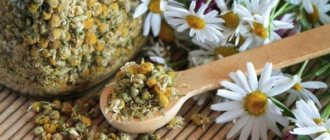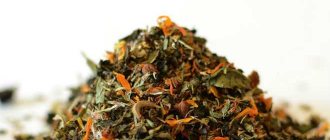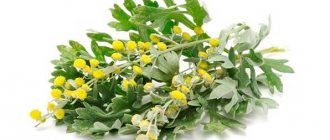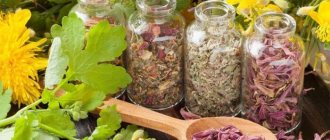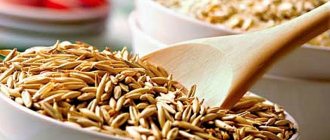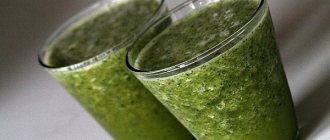The effectiveness of St. John's wort in the treatment of pancreatitis
The plant has a wide range of uses: treats the liver, gall bladder, inflammation of the pancreas, ulcers, and urinary tract. It calms the nerves, relieves depression, helps the heart, improves blood circulation, reduces pain of various origins, and strengthens the immune system.
The medicinal properties of St. John's wort are directly related to its chemical composition. The universality of the pharmacological qualities of the herb is based on it. Composition includes:
- flavonoids (hyperoside, rutin, quercitrin, isoquercitrin and quercetin), which protect cells and tissues of the body from inflammation and allergic reactions;
- essential oil that stimulates the immune system and reduces the impact of resistant forms of microbes;
- nicotinic and ascorbic acids;
- vitamins;
- tannins;
- traces of alkaloids;
- choline, anthocyanins, saponins and other compounds.
As part of complex therapy, St. John's wort for pancreatitis of the pancreas:
- relieves symptomatic signs of pathology;
- improves appetite;
- removes pathogenic microorganisms;
- accelerates the regeneration of damaged tissues;
- normalizes the patient’s psycho-emotional state;
- has a beneficial effect on the functioning of the digestive tract;
- speeds up the healing process.
The effect of drugs from this herb on the human body depends on the regularity of use, the doses prescribed by the doctor and the course of treatment.
Possible use in chronic pancreatitis
Acute pancreatitis is accompanied by severe pain, nausea, vomiting, diarrhea, high fever and requires emergency medical attention.
The unsystematic use of medicinal herbs during periods of exacerbation will cause harm and aggravate the already serious condition of the gland and the entire gastrointestinal tract. Considering the peculiarities of the effect of St. John's wort on the body during acute inflammation of the pancreas, the plant is not prescribed.
The chronic form does not have the full symptoms of the disease if the patient follows the recommendations of the attending physician. In the absence of exacerbations, the herb helps alleviate the course of the disease and prevent relapse. This is part of a set of measures aimed at stopping pain, eliminating swelling, inflammation and strengthening the immune system.
And although St. John's wort is an indispensable plant for eliminating pathologies in the functioning of the gastrointestinal tract, its use must be prescribed by a physician, gastroenterologist, or endocrinologist, indicating the dosage and duration of the course.
Contraindications
St. John's wort is contraindicated in conditions and diseases associated with pancreatitis:
- Pregnancy and lactation.
- Hypertension.
- Kidney and liver diseases.
- Thrombophlebitis.
- Postoperative period after organ transplantation.
- Rising temperature.
- Constriction of blood vessels.
- Pathologies of the optic nerve.
- The presence of low prothrombin, tendency to bleeding.
- Systematic constipation.
We recommend that you familiarize yourself with the benefits and harms of chamomile infusion
Folk remedies and pharmaceutical preparations based on St. John's wort should not be taken if therapy with antibiotics, certain hormonal drugs, blood thinners, antidepressants, amphetamines, etc. is necessary.
Like typical antidepressants, St. John's wort can negatively affect fertility in both sexes and reduce the effectiveness of oral contraceptives.
Preparation of infusion and decoction
St. John's wort, which is supposed to be used in the form of an infusion and decoction, must be purchased at a pharmacy or prepared independently. Inflorescences, collected in small bunches, are dried in a well-ventilated room in a suspended state at high temperature, avoiding direct sunlight.
After about a week, the flowers and leaves are suitable for further processing.
To prepare the infusion, you need to pour boiling water over the amount of herb required by the recipe, cover with a lid, wrap in a towel and leave for half an hour. Then strain the infusion through a sieve or a few words of gauze, squeeze out the remaining herb.
Drink during pancreatitis only as directed by a doctor.
The decoction is prepared from dry herbs, which, depending on the amount specified in the recipe, is poured with boiling water. The contents are brought to a boil again and boiled for 1-2 minutes or placed in a water bath and heated for 15 minutes. After removing from heat, cover with a lid, wrap in a towel, and leave for half an hour until cool. The liquid is filtered and the green mass is squeezed out. Take only as prescribed by a doctor.
Recipes for infusions and decoctions most often indicate 200-250 ml of water per 1 tbsp. medicinal raw materials.
The products are not intended for long-term storage. At most - 2 days in the refrigerator. Both the infusion and the herbal decoction are consumed without sugar.
List of herbs used for treatment
Not every plant is good for the pancreas. When selecting herbs for medicinal collection for pancreatitis, they are guided by many years of experience of folk herbalists. Herbal medicine is used as an additional or primary treatment. This depends on the nature of the disease. Herbal treatment of pancreatitis involves the use of:
- pharmaceutical chamomile;
- mint;
- St. John's wort;
- yarrow;
- dandelion;
- buckthorn;
- chicory;
- tansy;
- blueberries;
- nettle;
- birch buds.
This is not the entire list of herbs used in the treatment of pancreatitis. A herbal mixture is prepared from them or used separately.
Chamomile for pancreatitis
Chamomile is the most accessible plant used in the treatment of various forms of pancreatitis. The flower has a healing effect for disorders of the gastrointestinal tract, therefore it successfully relieves inflammation from gland tissues. Healers prepare chamomile according to the following recipes.
- Infuse 10 g of dried chamomile flowers in a glass of boiling water for 20-25 minutes. Then the mixture is filtered and the infusion is drunk warm, 100 ml 4-5 times between meals.
- Crush the dry plant along with the stem and leaves into powder. Use the resulting powder as tea leaves. Drink no more than 4 times a day after meals. Phytotherapy should be carried out for 1-2 months, but not longer. After the course, take a break of 2 months.
- They are also preparing a decoction. Chamomile, dill (inflorescences), immortelle flowers take 1 tablespoon each. Mix everything and pour 2.5 cups of boiling water. The mixture is kept for half an hour. Drink 150 ml after meals.
Such compositions of drinks help improve the digestion process, reduce bloating, and heal the gastrointestinal mucosa. But during exacerbation of the disease, they are used not as monotherapy, but as part of general treatment. Self-use of chamomile infusions is recommended for chronic pancreatitis.
Medicinal chamomile
Treatment with St. John's wort
It is useful to drink healing decoctions of St. John's wort for pancreatitis. This herb:
- acts bactericidal;
- increases immunity;
- regenerates tissue;
- relieves pain;
- calms down.
All these qualities of the plant are indispensable for relieving an attack of the disease, since it causes a rather painful condition. The chronic form is characterized by constant aching pain in the hypochondrium, intensifying after eating. Such symptoms “shatter” the nervous system, causing irritation and even depression in the patient. Therefore, the sedative properties of St. John's wort are very useful.
Oil prepared independently is effective. To do this, dry grass is crushed and poured with warm sunflower oil, sealed in a bottle and placed in a dark place for a month. Take 1 tbsp before meals. After 3-4 doses, the swelling of the gland decreases, and the general condition of the body improves.
An herbal infusion is prepared as follows. Dry St. John's wort is poured with boiling water, a lid is placed on top and left to steep for a day. Drink 20 g 30 minutes before meals, 2 times a day.
Advice! Do not cook medicinal herbs over high heat. When boiling, the active substances evaporate.
St. John's wort
Peppermint therapy
It is common that mint drops or menthol are used for heart diseases or colds. But the plant is no less effective for diseases of the gastrointestinal tract. In case of pancreatitis, mint:
- restores organ parenchyma;
- activates the production of enzymes;
- relieves spasm;
- reduces inflammation.
In addition, mint is a strong anesthetic and sedative. The plant is often used in the form of tea (1 teaspoon of fine dry herb is brewed in 200 ml of boiling water). This drink is taken 3-4 times after meals. Mint for tea is taken not only dry, but also fresh leaves. Sugar or honey is added to the drink for taste.
Mint decoction is also used to treat the disease. To do this, pour 2 teaspoons of dry mint into boiling water, cover with a lid and simmer over low heat for 15 minutes, leave for 15 minutes. Then take the decoction, after straining, 0.5 tbsp before meals 3 times a day.
During this treatment, blood pressure decreases slightly. Therefore, hypotensive patients need to closely monitor their condition and, if unpleasant symptoms appear, reduce the number of doses or stop therapy.
Mint
Herbal collection for the treatment of pancreatitis
It is useful to treat inflammation of the parenchyma not with one, but with several herbs at the same time. The combination of plants enhances the therapeutic effect of intake and has a positive effect on the functioning of internal organs and systems as a whole.
Recipe 1:
- mint leaves;
- immortelle;
- chamomile flowers;
- calamus;
- valerian.
Ingredients take 1 tbsp, except mint, you need 2 tbsp. 10 g of the mixture is poured into 300 ml of boiling water, infused and drunk 150 ml an hour after meals.
Recipe 2, multiplicity 5:4:4:
- marshmallow (root);
- calendula flowers;
- Potentilla (root).
Pour 1 tbsp of the mixture with a glass of boiling water, cook for 15 minutes, leave for 1 hour. Then strain and drink a third of a glass three times a day.
Recipe 3. Multiplicity 4:4:3:3:2. Herbs are presented:
- immortelle;
- St. John's wort;
- highlander bird;
- buckthorn bark;
- chamomile flowers.
25 g of the mixture is poured into a liter of boiling water and left overnight. The morning before meals, drink 200 ml of infusion, the rest of the liquid is divided into 3 doses and drunk throughout the day.
Herbal tea for pancreatitis
Herbal tea according to the recipe of Tibetan monks is especially popular. Compound:
- birch buds;
- St. John's wort;
- chamomile;
- immortelle.
Take the herbs equally, mix and pour 1 tablespoon of the mixture into half a liter of boiling water. You need to steep the tea for 8-10 minutes and drink it without anything or with sugar, honey, or jam.
The effect of meadowsweet on the pancreas
The grass is also called meadowsweet. This is a herbaceous plant with thick stems and powerful rhizomes. It is used as an anti-inflammatory, regenerating and hemostatic agent. Inflammation of the pancreas is relieved by tea from meadowsweet. In the evening, pour 1 tablespoon of fine dry grass into 200 ml of warm (22-25*C) boiled water, in the morning, drink the strained infusion 1/3 cup three times a day before meals.
Collection of herbs helps well against illness:
- meadowsweet;
- calendula;
- birch leaves;
- mullein;
- linden flowers and leaves.
Prepare the infusion as usual (1 tbsp mixture per 1 tbsp boiled water). After cooling, drink the drink throughout the day, dividing it into small portions.
Meadowsweet
Herbal preparations based on St. John's wort
The specific active ingredients of St. John's wort have already been studied by scientists for the effectiveness of their properties. The effectiveness of the plant has been proven by the centuries-old practice of traditional medicine. However, it should be prescribed after a comprehensive examination and exclusion of all contraindications.
St. John's wort, due to its chemical composition, is a potent medicinal plant, therefore, to mitigate the effect on the human body, it is recommended to use it as part of preparations. The use of St. John's wort with other herbs for pancreatitis is considered an auxiliary and effective addition to dietary therapy.
For pancreatic therapy, plants are selected that have anti-inflammatory, diuretic, antiseptic, choleretic and analgesic properties. Herbal medicines help improve well-being, eliminate negative symptoms, and inhibit the development of inflammatory processes. Their use is combined with medications prescribed by the attending physician.
More often than others, along with St. John's wort, the complex of medicinal products for diseases of the digestive system and chronic pancreatitis includes: chamomile, calendula, yarrow, plantain, peppermint, hawthorn, rose hips, dill, aloe, horsetail, nettle, sandy cumin, calamus, sage, etc. .
We recommend that you familiarize yourself with Chamomile in the treatment of pancreatitis
Herbal collection 1
Herbal collection 1 is recommended for the prevention and as part of complex therapy for diseases of the pancreas, gall bladder and bile ducts.
The herbs included in the collection activate the function and improve blood supply to the pancreas, help restore beneficial intestinal microflora and relieve spasms (chamomile, St. John's wort, dandelion roots), eliminate pain, inhibit fermentation and putrefactive processes, envelop and protect the mucous membranes of the gastrointestinal tract.
Ingredients:
- Herb St. John's wort - 20 g.
- Chamomile inflorescences - 20 g.
- Common agrimony herb - 20 g.
- Great plantain leaves - 20 g.
- Peppermint leaves - 20 g.
- Dandelion root -20g.
Preparation: 1 tbsp. l. pour 0.4 liters of boiling water over the mixture, leave for 1 hour, strain.
Drink the drink warm, 1/3 glass 30 minutes before meals 3 times a day. The course of admission is 3 months (1 month of admission, break 10 days, etc.).
Contraindications for use:
- individual intolerance to certain herbs in the collection;
- exacerbation of chronic kidney diseases;
- thrombophlebitis;
- pregnancy and lactation.
The herbal collection should be taken with caution if you have increased blood clotting.
Phytocollection 2
Herbal collection 2 for pancreatitis normalizes digestion, improves appetite and the body's regenerative capabilities, soothes pain, eliminates inflammation, and strengthens the body's protective properties.
The complex of herbs stimulates intestinal motility, activates the production of pancreatic juice, restores the optimal balance of intestinal microflora, and destroys pathogenic microorganisms.
All roots, stems, leaves, flowers of the herbs included in the collection are useful, have universal properties and are used for many diseases.
Ingredients:
- Herb St. John's wort - 20 g.
- Sandy immortelle inflorescences - 20 g.
- Ivan tea leaves - 20 g.
- Calendula flowers - 20 g.
- Potentilla herb - 20 g.
- Large burdock leaves - 20 g.
- Common raspberry leaves - 20 g.
- Great plantain leaves - 20 g.
- Chamomile flowers - 20 g.
- Calamus roots - 20 g.
- Trifid succession herb - 20 g.
- Celandine grass - 20 g.
- Yarrow herb - 20 g.
- Meadow geranium leaves - 20 g.
Preparation: 1 tbsp. l. pour 0.25 liters of boiling water over the mixture and keep in a water bath for 30 minutes. Filter the liquid, squeeze out the remainder into a decoction, add water to a full glass.
The decoction can be drunk 30-40 minutes before meals 3 times a day. It is important that the drink is fresh.
Contraindications for use are the same as for using the herbal mixture 1. The drink should not be used for a long time and should not be recommended for the treatment of children.
We recommend that you familiarize yourself with St. John's wort, a helper for depression
Recipes for using St. John's wort
St. John's wort for pancreatitis is taken in the form of decoctions, infusions, tinctures, and oils. The plant can be used independently or as part of medicinal preparations.
Tea
5 gr. dried herbs or 10 gr. fresh pour 300 ml. boiling water Leave for 5 minutes under the lid. Drink half an hour before meals like regular tea. Sugar or honey is added to taste. It should be remembered that sweets with pancreatitis should be consumed in very moderate quantities.
Decoction
To make a decoction, you need to pour a tablespoon of dried raw material into 250 ml. boiling water Then place the mixture in a water bath for 15 minutes. The drink should not be brought to a boil. Afterwards, cool the broth and strain through cheesecloth. Add the resulting liquid to a volume of 300 ml. boiled water.
Infusion
Pour four tablespoons of fresh or three tablespoons of dried ingredients into 500 ml. boiling water, close the container tightly with a lid. Wrap the container with the drink in a blanket or towel and place it in a dark, well-ventilated room for four hours to infuse. After the specified time has passed, strain the drink. Store in the refrigerator for no more than three days. The drink can only be consumed warm.
Tincture
To prepare a tincture of St. John's wort, you need to pour two teaspoons of the dried ingredient into 100 ml. vodka or alcohol 40%. Place the mixture in a dark, well-ventilated place to infuse. After three days, shake well. After five days from the moment of preparation, the product must be strained, squeezing the cake well.
Keep refrigerated. Take twenty drops dissolved in 100 ml of water once a day half an hour before meals.
St. John's wort oil
To prepare the oil, you need to place 150 grams of St. John's wort flowers or the tops of the plant in an enamel container. Pour the ingredient with half a liter of olive, corn or unrefined sunflower oil. Then place the vessel in a water bath and heat for about 30 minutes. After the specified time has passed, remove the mixture from heat, close the lid and set aside in a dark, cool place to infuse for three days. Then strain.
Store in the refrigerator for no more than four months. Take a teaspoon once or twice a day.
Medicinal fees
| Means | Preparation | Use |
| Recipe 1 | Chamomile and St. John's wort help very well with chronic pancreatitis. To prepare the decoction, you need to mix two teaspoons of dried ingredients and pour 300 ml of boiling water over them. Then place the container with the mixture in a water bath and simmer for 15 minutes. After cooling, strain, add boiled water to a volume of 300 ml. | The drink is divided into 3 parts and drunk throughout the day. |
| Recipe 2 | You can also prepare a healing decoction from St. John's wort, peppermint and chamomile. You need to take 10 mg of dried ingredients and pour 300 ml of boiling water over them. Simmer in a water bath for 15 minutes. After straining, add boiled water to the original amount. This collection helps improve digestion, intestinal microflora and has effective calming and analgesic properties. Contraindicated in case of increased blood clotting. | The composition is divided into 3-4 parts and taken throughout the day. |
| Recipe 3 | Based on 500 ml. take 1 tbsp of hot water. herbs nettle, St. John's wort and meadowsweet. The mixture is infused for 4 hours. The finished drink is a good pain reliever for chronic gastrointestinal diseases. | The collection is drunk in 100 ml. up to 5 times a day. |
| Recipe 4 | The components included in this collection not only relieve pain, but also eliminate severe heartburn. Mix 1 tbsp. herbs St. John's wort, cudweed and yarrow, pour 1 liter of boiling water and leave for about 2 hours. | During the day, drink 100-150 ml. up to 5 times half an hour before meals. |
| Recipe 5 | Grind 2 tbsp. dried St. John's wort and 1 tbsp. leaves or black currant berries, pour 1 liter of hot water and leave for 2 hours. | Take 100 ml. drink about 3 times a day. |
| Recipe 6 | Combine 2 tbsp. dried St. John's wort herb, with 1 tbsp. mint leaves and 1 tbsp. chopped rose hips, pour 800 ml. boiling water and leave for about 4-6 hours. | You can drink a glass of the prepared mixture a day. |
Is it possible to use alcohol tincture?
There are plenty of recipes for wine, alcohol and vodka tinctures with St. John's wort in the popular phytotherapeutic literature. But it is better not to use them orally for acute and chronic pancreatitis.
Any amount of alcohol, enhanced by the extract of the chemical components of St. John's wort, is aggressive towards the tissues of the pancreas and harms the entire body.
Even in small doses, alcohol tinctures cause spasm of the sphincter of Oddi, characterized by partial obstruction of the ducts for bile and pancreatic juice.
Medicines based on St. John's wort for pancreatitis
Pharmaceutical forms of medicines contain dry or liquid extract of St. John's wort, among them:
- Phytofarm (St. John's wort oil capsules) is an effective and easily digestible form. Recommended for regeneration of gland tissue and strengthening the immune system.
- Herbion Hypericum - capsules. Prescribed for pain, and also as an antidepressant and anti-allergenic agent.
- Deprim and Deprim forte - capsules. They relieve pain, improve the general condition of the body, and strengthen the nervous system.
- Vivasan Relax is a pill, a general tonic.
- St. John's wort (Zveroboi) - tablets. Antidepressant effect, increases mental and physical activity, normalizes sleep.
- St. John's wort extract has antidepressant, anxiolytic and sedative effects. It has a beneficial effect on the functional state of the central and autonomic nervous system.
Preparations based on St. John's wort for pancreatitis can be used as additional means that improve the general condition of the body. They are prescribed by a doctor because they have contraindications and do not always have a positive effect on the pancreas.
The use of herbal medicine in the treatment of pancreatic disease
The use of medicinal plants for pancreatitis is one of the components of the complex treatment of pathology, aimed at eliminating painful symptomatic manifestations, relieving the inflammatory process and swelling, as well as strengthening the body's immune defense system.
The development of the inflammatory process in the pancreatic cavity causes the manifestation of extremely unpleasant symptomatic signs, expressed as:
- sharp pain
- dysfunction of the dyspeptic organ system,
- weight loss,
- discharge of vomit, etc.
The greater danger is the acute form of pancreatic disease during an attack, which has a high probability of death for the patient against the background of painful shock and a sharp spread of the intoxication process in the body cavity.
Untimely treatment of acute pancreatic disease, as well as an incomplete course of its elimination, can cause the development of a chronic form of this pathology, from which it is almost impossible to get rid of. Chronic pancreatic lesions of the pancreas are characterized by an alternating course with periods of remission and exacerbations.
The use of herbs for the pancreas is not only an effective remedy, but also one of the most powerful prophylactic agents aimed at preventing the exacerbation of a chronic disease and the development of other pathologies.
St. John's wort is a medicinal plant, included in the list of the most effective medicinal herbs that help against pancreatic damage to a parenchymal organ. Let's take a closer look at the benefits of this herb and how to use it.
Consequences of overdose
St. John's wort is a low-toxic herb that has different effects on the human body. With long-term use of products containing the plant, hormonal imbalance is possible, leading to impotence in men and the appearance of hair on the face and chest in women.
An overdose is manifested by pain, cramps, and symptoms of acute gastritis. Incorrect dosing is characterized by dryness and bitterness in the mouth. Allergic reactions, dyspepsia, nausea, vomiting, headache, and fatigue are observed.
Signs of overdose
St. John's wort is a low-toxic medicinal herb, but sometimes long-term use can cause hormonal imbalance, which leads to facial and chest hair growth in women and potency disorders or impotence in men. Incorrect dosing of drugs based on this medicinal plant can lead to dryness and bitterness in the mouth. In extremely rare cases, the patient may experience signs of an allergic reaction in the form of a skin rash, feelings of fatigue, anxiety and dyspeptic disorders.



